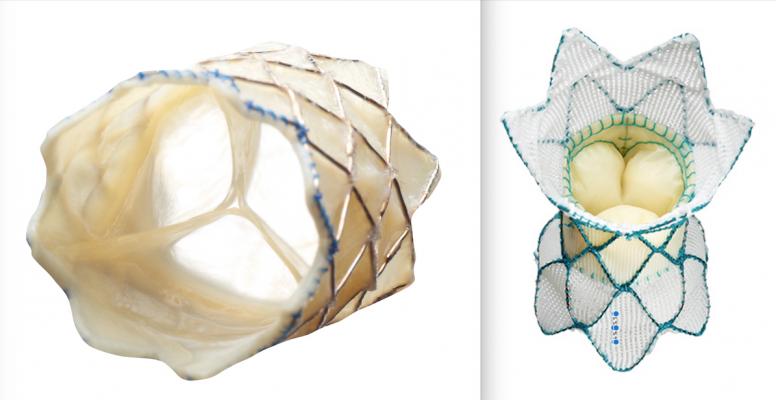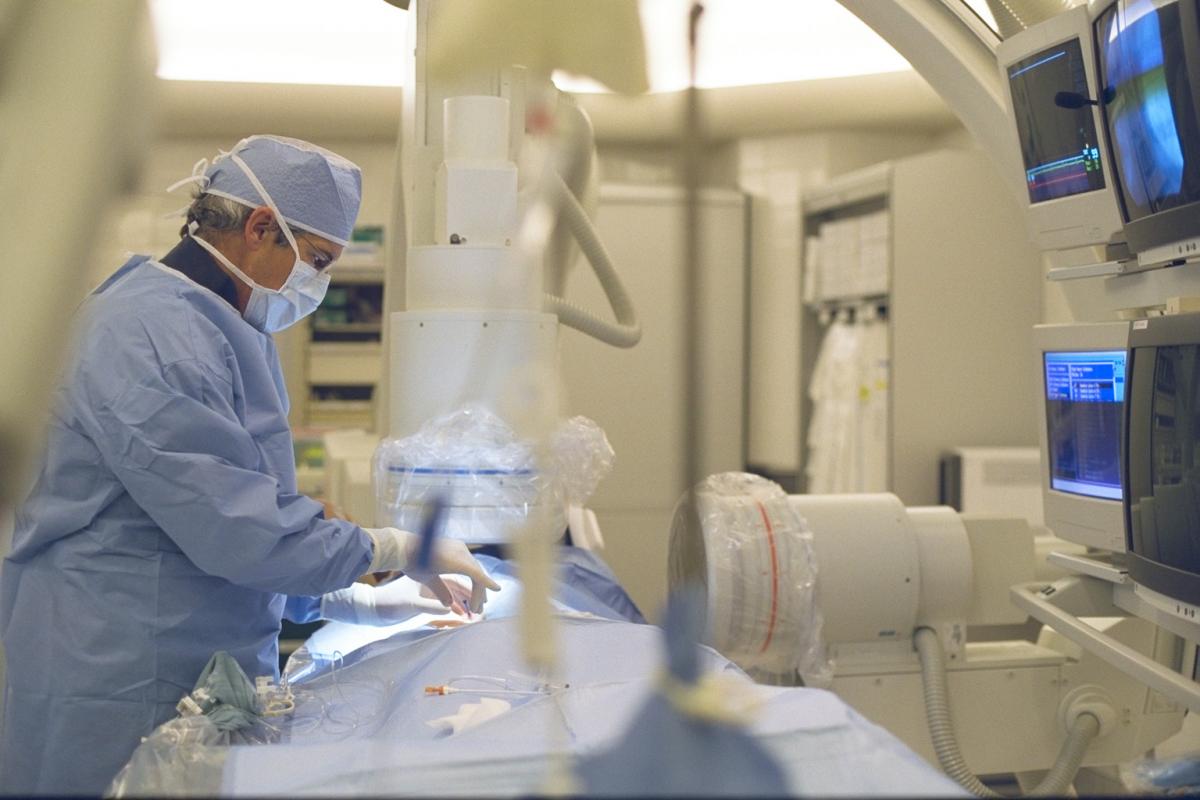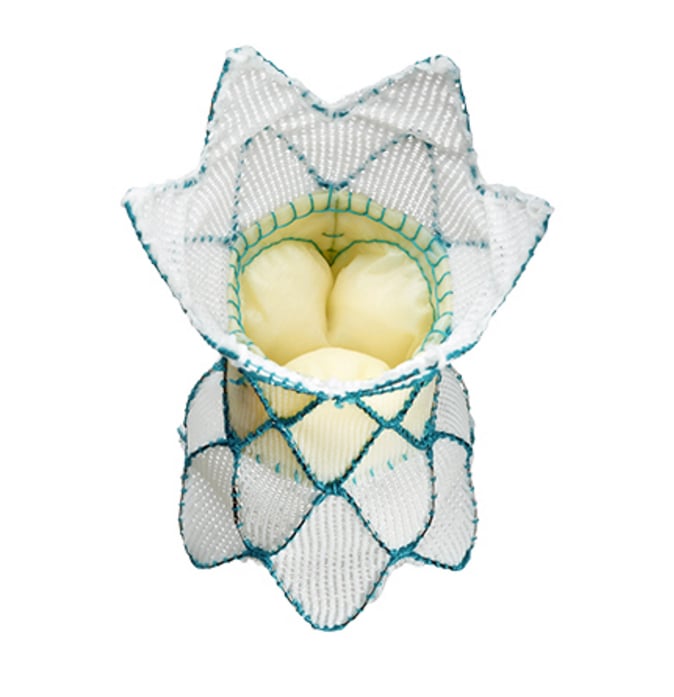
Left, the Melody pulmonary valve was the first transcatheter valve to be approved by the FDA in the United States a decade ago. Right, the Harmony transcatheter valve is in trials and is designed to treat patients with RVOT anomalies who develop severe PR typically when a pervious repair fails. Both valves are used to treat congenital heart defects.
May 21, 2020 — Two late-breaking clinical trials on trans catheter valves to treat congenital heart disease were presented at the 2020 Society for Cardiovascular Angiography and Interventions (SCAI) virtual Scientific Sessions. These included the 10-year outcomes from the Melody Transcatheter Pulmonary Valve (TPV) demonstrating strong long-term hemodynamic and safety outcomes. The other was the first results from the investigational Harmony TPV pivotal trial met safety and efficacy endpoints for hemodynamic function at six months.
Congenital heart disease (CHD) is the most common type of birth defect in the United States, affecting an estimated 40,000 infants each year.[1] Approximately 22 percent of CHD patients have structural malformations that disrupt the connection between the heart and the lungs, called the right ventricular outflow tract (RVOT).[2] Typically, a subset of these patients will require open-heart surgery early in life to correct these malformations and some will receive a prosthetic conduit that increases blood flow from the heart to the lungs. Once the conduit is no longer functional, in regions where commercially approved, Melody TPV can be implanted to restore pulmonary valve function and delay additional surgical intervention. As part of the Medtronic congenital heart disease program, the safety and effectiveness of the Harmony TPV is currently being evaluated for patients with RVOT malformations who require a correction to their structural malformation early in life and need a minimally invasive option to restore pulmonary valve function, and are without a conduit.
Melody TPV 10-Year Data Highlights
The study demonstrated sustained long-term function of Melody TPV when compared to the historical control of surgical conduit. Highlights include:
• The Melody TPV demonstrated consistent hemodynamics through 10 years as measured by stable RVOT gradients.
• Strong valve efficacy with 97% none/trace/mild pulmonary regurgitation at 10 years.
• Annualized incidence of TPV-related endocarditis was 2% per patient-year, over the course of long-term follow-up.
• Freedom from major stent fracture 84% at 10 years, steady after five years.
• Freedom from any reintervention (surgical or catheter) was 61% at 10 years.
“Having long-term data is an important milestone especially for this pediatric patient population who are growing and changing so rapidly during a 10-year period,” said Thomas K. Jones, M.D., director of cardiac catheterization at Seattle Children’s in Seattle, Wash. “While the study reinforces the longevity, durability, and efficacy of the Melody TPV, it will also serve as a study model for future evaluations of novel pediatric congenital heart disease technologies.”
The Melody TPV 10-year outcomes trial studied 150 implanted patients ranging from age 7-53, with a median age of 19, and the primary indication for intervention was pulmonary regurgitation (PR). The study assessed Melody long-term functionality, or TPV dysfunction, which is defined as re-operation, catheter re-intervention, or hemodynamic dysfunction (i.e. moderate or greater PR and/or mean RVOT gradient >40 mm Hg). The study’s safety outcomes included serious device-related adverse events, stent fracture, catheter re-intervention, surgical conduit replacement and mortality rate.
The first transcatheter valve implanted in a human anywhere in the world and the first to be approved by the Food and Drug Administration (FDA), Melody is the longest studied TPV with the largest body of evidence. This landmark 10-year study provides insight into the long-term durability, safety, and effectiveness of the Melody TPV.

Tom Jones, M.D., implanting a Melody transcatheter pulmonary valve in a pediatric patient at Seattle Children's Hospital.
First Data From the Harmony TPV Pivotal Trial
The Medtronic Harmony Transcatheter Pulmonary Valve Clinical Study met its primary safety and effectiveness endpoints of freedom from procedure or device-related mortality and met its hemodynamic function target at six months. Highlights from the trial include:
• 100% of patients experienced freedom from procedure-or device related mortality at 30 days.
• Acceptable hemodynamic function at six months was achieved in 89% of the pivotal trial participants.
• For the pre-specified primary endpoint analysis, 91% of patients from both the EFS and pivotal trial achieved acceptable hemodynamic function, surpassing the performance target of 75%.
• 84% of patients were free from device failure at six months
• At six months, 94% of patients had no, or mild pulmonary regurgitation and 97% had no or mild paravalvular leak
 Building onto the initial Early Feasibility Study (EFS), the pivotal study was designed to evaluate the safety and effectiveness of a minimally invasive alternative to open-heart surgery. Harmony TPV was designed to treat patients with RVOT anomalies who develop severe PR typically when a pervious repair fails.
Building onto the initial Early Feasibility Study (EFS), the pivotal study was designed to evaluate the safety and effectiveness of a minimally invasive alternative to open-heart surgery. Harmony TPV was designed to treat patients with RVOT anomalies who develop severe PR typically when a pervious repair fails.
"These pivotal data support the rationale for a potential new therapy designed specifically for the right ventricular outflow tract,” said John P. Cheatham, M.D., lead principal investigator and professor emeritus, Department of Pediatrics, Cardiology at Nationwide Children's Hospital in Columbus, Ohio. He also serves as the lead principal investigator of the Harmony Trials. “If future study data continues to be strong, we’re hopeful that Harmony may potentially impact this critical, hard-to-treat segment of patients, who have limited treatment choices with current transcatheter technologies.”
This trial is a prospective, non-randomized study evaluating procedural success, safety, and performance of the Harmony TPV device. The study was active across 12 sites in the U.S., Canada and Japan among 50 patients with a mean age of 29 +/- 11. The rigorous patient selection process included those with severe PR after RVOT malformation repair, and an indication for surgical placement of a RV-pulmonary artery conduit or bioprosthetic pulmonary valve. Due to the highly variable anatomy of the patient population, the study required careful screening to assess device fit.
“Until recently, the only option for a patient that had severe PR after previous open heart surgery was to return to the operating room for another open heart surgical procedure, either a bioprosthetic Pulmonary Valve replacement or an RV-PA conduit,” Cheatham explained. “The Harmony TPV therapy finally offered a non-surgical option to treat severe PR and restore pulmonary valve competence.”
Worldwide, the Harmony TPV is limited to investigational use and not approved for sale or distribution.
In collaboration with leading clinicians, researchers and scientists worldwide, Medtronic offers the broadest range of innovative medical technology for the interventional and surgical treatment of cardiovascular disease and cardiac arrhythmias. The company strives to offer products and services that deliver clinical and economic value to healthcare consumers and providers around the world.
Find more news and late-breakers from SCAI 2010
References:


 January 05, 2026
January 05, 2026 









